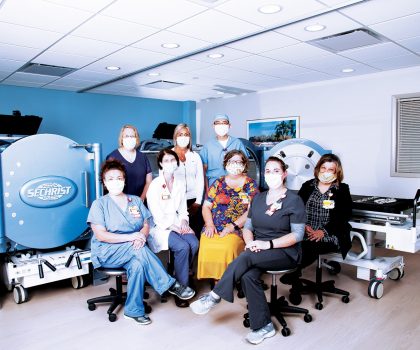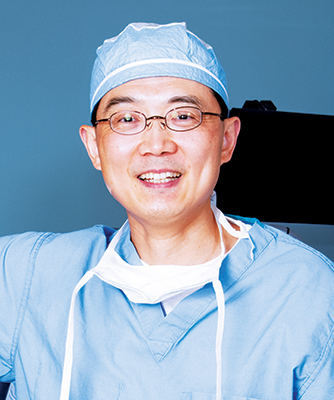The new UH Geauga Wound and Hyperbaric Medicine Center features advanced treatments and is committed to providing the best wound care available

By Ken McEntee
About seven million Americans are living with non-healing chronic wounds, and many of them are not seeking advanced wound care, laments Beth Pacovsky, program director at the new University Hospitals Geauga Medical Center’s Wound and Hyperbaric Medicine Center, in Chardon.
Reasons for not healing can include poor circulation, infection, swelling, or chronic conditions like diabetes. Non-healing wounds can be painful and life threatening, but most importantly can severely impact a person’s quality of life.
“In some cases, letting a wound go untreated can eventually result in the need for amputation, major surgery and hospitalization,” Beth cautions.
Fortunately, she says, advanced wound care is available more conveniently than ever before, following the recent opening of the UH Geauga Wound and Hyperbaric Medicine Center at UH Geauga Medical Center.
The new center features advanced treatments like Hyperbaric Oxygen Therapy (HBOT) and is committed to providing the best wound care available, promises Liming Yu, MD, a general surgeon and medical director of the wound center.
“Our wound clinic has been treating patients since 2014, but our new facility has enabled us to expand our services to include Geauga County’s first HBOT chamber, expand our disciplines to include infectious disease and podiatry, and add another exam room in a beautiful, state-of-the-art location,” Dr. Yu says.
Despite the possible repercussions, Beth says that many patients do not seek advanced wound care to treat their wounds.
However, she assures, treatment is just a phone call away.
The clinic gets many referrals from family physicians, but people whose lives are affected by their chronic, non-healing wound can call the wound center themselves to make an appointment.
“Our goal is to see them within 24-48 hours,” she says.
A patient’s path to healing begins with an extensive evaluation, followed by the development of a customized plan of care. If a wound doesn’t heal or improve as expected within four weeks, the plan is reevaluated to consider alternative treatments, such as HBOT, Dr. Yu says.

HBOT is a medically-recognized treatment that involves breathing 100 percent oxygen in a pressurized chamber. This will significantly increase the amount of oxygen carried in the bloodstream. Taking in a significantly higher amount of oxygen than normal provides body tissue with more fuel to heal a chronic wound, which is often caused by compromised circulation with abnormally low oxygen level, Dr. Yu explains.
HBOT helps wound healing through other mechanisms as well, such as stimulating new blood vessel formation, increasing the production of wound healing growth factors, inhibiting the growth of bacteria, or even killing bacteria. The treatment takes place in a clear, acrylic chamber inside which a patient lays on a stretcher and can watch TV or a movie. Sessions typically last for about 90 minutes.
Most wound patients are people with diabetes and vascular diseases who are at high risk for foot and leg ulcers. Infections from those wounds can spread to the bone. Pressure injuries, traumatic injuries and radiation therapy are other potential sources of wounds, Dr. Yu says. Conditions that can prevent proper healing can include poor circulation, the presence of non-viable tissue, infection, swelling, persistent injury from pressure, poor nutrition, poorly controlled blood sugar and cigarette smoking.
The wound center, Beth says, was established to address a growing need in the local community.
“The need for wound care is rising because of the aging of the population and the increasing prevalence of diabetes and other chronic diseases,” she says.
“We take a multidisciplinary approach to healing wounds,” Dr. Yu says. “We collaborate with many specialties including vascular medicine, endocrinology, cardiology and our team includes general surgeons, podiatrists, licensed nurse practitioners, physician assistants and an infectious disease nurse with plans to include other specialties in the future.”
You can schedule an appointment at the UH Geauga Wound and Hyperbaric Medicine Center by calling 440-901-6366. UH Geauga Medical Center is located at 13207 Ravenna Road, in Chardon. You can learn more by visiting UHHospitals.org/locations/uh-geauga-medical-center.
